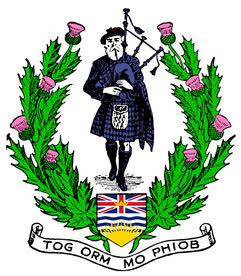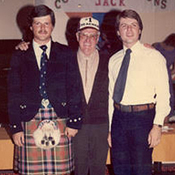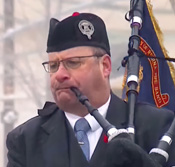A lovely spring day in Vancouver and this could have been the first outdoor club meeting. However, we held with tradition and the McIlwaine family graciously hosted another fine evening of the big music indoors.
The first feature piper of the month was Tori Killoran playing “The King’s Taxes”. This was her first appearance at the Piobaireachd Club. When Gaelic culture ruled in the highlands, clansmen paid for the use of land with service to the Chieftain. This all changed when the King began to forcefully collect tax.
Will Nichols was also a feature piper for the evening playing “Lament For Captain MacDougall”. This piece is thought to have been composed by Ranald Mor MacDougall – the grandson of Ranald Ban MacDougall who composed “The King’s Taxes”. This Piobaireachd honours Alexander (Sandy) MacDougall who was killed in Spa in during the Peninsula War. The MacDougalls maintained a school of piping known as “The Piper’s Croft” up until at least 1864.
Greg MacDonald followed with “The Massacre of Glencoe” and Thomas Budd with Lament For MacDonald of Kinlochmoidart #1. Although there is uncertainty about the composer and origin, it is certainly connected with the Jacobite uprising in 1745/46. Andrew Lee played “Nameless”.
Kyle Banta played “Massacre of Glencoe” and he maintained his concentration when there was a loud bang at the door. A police officer had come to enjoy the music. Somebody else had suggested that he was there to respond to a noise complaint, but this is too absurd to believe.
Jack Lee closed the evening with “Prince’s Salute”. The terms “Prince” and “King” seem to be only loosely applied in piobaireachd composition making it more difficult to decipher who the piece was intended for. John MacIntyre was the composer, but there are differing opinions on which Prince it was for. The popular opinion is that it was James, Chevalier de Saint George, who would have been King James VIIIth of Scotland and IIIrd of Britain if he had succeeded in one of the rebellions of 1715 and 1719. James was referred to by supportive Gaels as Righ Seumais which translates to King James. He was also referred to as Prince James, and, The Old Pretender. A different school of thought is that it was for his son, Prince Ch arles Edward Stuart; or The Young Pretender, or Bonnie Prince Charlie.
The next meeting will likely be near the end of September or early October.




